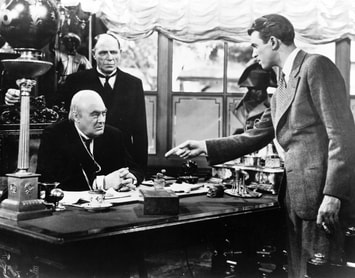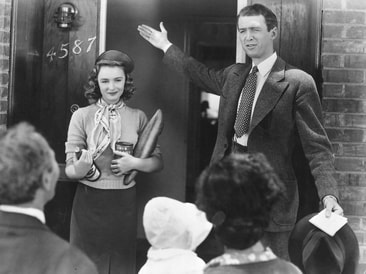
https://christiananswers.net/spotlight/movies/2001/itsawonderfullife.html
When it comes to the cinematic works of famed Hollywood director Frank Capra, I’m certainly no expert. In truth, I’ve only ever seen one of his forty-one features (excluding his propaganda films) and it’s the one that has undoubtedly received the most recognition out of his entire filmography. Of course, I’m referring to the beloved Christmas classic It’s a Wonderful Life, starring the late, great (and much-underappreciated) Jimmy Stewart.
The story is simple: George Bailey (Stewart), a mild-mannered resident and family man of Bedford Falls, selflessly cares for his fellow residents – yet he longs to see the world. He devotes himself, through the work of the family’s building and loan company, to ensuring that the disadvantaged are given a decent roof over their heads and aren’t made to live in poverty. However, when some misplaced company funds are found and subsequently hidden by the unscrupulous businessman Mr. Potter (Lionel Barrymore), George realises that this loss will cause irrevocable damage to family business, thereby allowing Potter to assume financial control over those whom George vowed to help. Believing that he’d be worth more to his family and friends dead than alive (his life insurance policy will more than cover what is owed to the bank), George considers suicide. Meanwhile, in Heaven, an angel is dispatched to earth, to show George just what life would have been like, if he had never been born…
When I finally caught up with the film for the first time, four years ago, I realised just how embarrassingly late to the party I was (I know, I know, call myself a film fan). Friends of mine had been actively encouraging me to watch it for quite some time, but I guess I just wasn’t sold on the idea of what I thought would be a schmaltzy, loose retelling of the already perfect Dickens’ A Christmas Carol. Well, I’m happy to say that I was proved most wrong. It’s a Wonderful Life might have been unfairly labelled as “Capra-corn” by its critics, but the sentiment of this seventy-five-year-old classic rang completely true then and now. Its motifs are timeless: selflessness (even at great cost to oneself), integrity, good triumphing over evil, the importance of community… The film even spoke to me of the Gospel message, which prompted me to encourage you, dear reader, to take a closer look at it again this Christmas - even if you do consider the film to be “Capra-Corn”. Here are some of my own spiritual reflections that I recently had, upon revisiting this festive favourite…
1) What is it that truly matters?
In one scene, set in Peter Bailey’s office, George spots a framed motto which hangs beneath a picture of his father: “All you can take with you is that which you’ve given away”, it reads. It’s arguably a proverb, but one which functions as a key motif that runs throughout the entire film – for it prompts us to consider the question, ‘What truly matters in this life of ours?’. It seems clear to me that Capra and his fellow screenwriters believed not only in achieving the “American dream”, but also in the notion that the way in which we treat one another, even in the tedium of everyday life, is of greater, lasting consequence than what we seek to do for ourselves in the here and now.
This worldview is explored through the contrasting characters of Mr. Potter, and George. On the one hand, we have a merciless & heartless businessman who cares only for accruing great wealth, irrespective of the personal cost it brings to those around him. (It seems that Barrymore might have tapped into his former role of Ebenezer Scrooge, from his twelve-year run on the airwaves, to draw out such wickedness in his character.) And on the other, we have George – a man who’s hopes, dreams, and ambitions, lie far beyond the borders of Bedford Falls. But when George must step up to the plate for the sake of his family, friends, and the people of Bedford Falls, he does so willingly – even at great personal cost to himself. I believe he does this because he knows that one’s earthly possessions and experiences are not the ultimate treasure which leads to lasting contentment. For in Potter, he sees only a "warped, frustrated old man", even though he controls most of the town and is obviously very rich indeed.
And this reflects, in part, God’s view upon worldly possessions. He teaches us, in the Bible, that our worldly possessions will only pass away – that’s because this planet and our lives are temporary, so by extension then, so too are material possessions. Jesus therefore encourages all who follow Him in this way: “Don’t store up treasures here on earth, where moths eat them and rust destroys them, and where thieves break in and steal. Store your treasures in heaven, where moths and rust cannot destroy, and thieves do not break in and steal” (Matthew 6:19-20, NLT). He’s encouraging us to look to God above and ensure that our only treasure is found in Him alone – for a relationship with the living God will save us and last for eternity, whereas that which we cling so tightly to now, will not: “Those who depend on their wealth will fall like the leaves of autumn, but the righteous will prosper like the leaves of summer” (Proverbs 11:28, GNT). We are, however, called to be good stewards of the gifts we’ve been given in our world. For example, George has the buildings and loan company, which he believes should be utilised for the good of those around him. This reminded me of 1 John 3:17 (GNT), in which believers who are well-off, are encouraged to exhibit love through financial giving: “If we are rich and see others in need, yet close our hearts against them, how can we claim that we love God?”. So then, what truly matters is the way in which we treat those in our lives today (for this will be remembered for eternity), and where our treasure is found. The good that we do today, for not only those around us but primarily for Christ, will last for eternity – will you choose to bring honour and glory to God today?
2) Self-sacrifice …sure – but at what cost, exactly?
One could argue that It’s a Wonderful Life’s most challenging theme is that of almost total self-denial – embodied completely by George. He abandons his own interests, longings and needs, to take up a life-long posture of self-sacrifice. We first see this modelled in George valiantly rescuing Harry from drowning, but at the cost of losing hearing in his left ear. Later in life, George postpones his travel to run the family business, following the death of his father, and at the request of the company’s board members who are desperate for the company not to fall into the hands of Potter. Again, this costs him greatly in relation to his plans for travel and tuition. But in giving of himself sacrificially, to his family and to the people of Bedford Falls, we watch as George inherits that which is far greater than what he could have imagined: he marries the wonderful Mary, starts a family, and helps local people to escape poverty. He makes a difference in this world, despite his sacrifice.
In living his life sacrificially, George imitates Christ himself (whether he knows it or not). Yes, he struggles with the crushing loss of watching his younger brother Harry living out the life he had planned for himself and watches on in deep sorrow as a train leaves Bedford Falls – it’s only natural. But even that which he wouldn’t have planned for himself, was arguably planned by God to bring blessing to those who needed it most, and even George himself. There’s no guarantee that George would have even been content with the life he had planned for himself. After all, he wouldn’t have married Mary or had children with her and would look on as Potter destroyed the lives of those whom he loves. But the life that Jesus calls us to live is one of self-denial, and self-sacrifice. It isn’t easy, but it commands a blessing: “If you try to hang on to your life, you will lose it. But if you give up your life for my sake, you will save it. And what do you benefit if you gain the whole world but lose your own soul? Is anything worth more than your soul?” (Matthew 16:24-26, NLT). In following him, we deny the sinful ways of the world and follow God’s way – even when His plans might not match up with ours. But that’s more than okay, because everything we lose is worth far less than what we gain: salvation, relationship with the God who made you, peace, love, joy, hope and so much more! To know Jesus personally is to have “a rich and satisfying life” (John 10:10, NLT), far beyond our comprehension. George Bailey realised what it meant to live a rewarding life, but with God, we can live out one of abundance today, because Jesus made a way for us to be rescued from sin and death, when He died on the cross, and rose from the dead on the third day. Will you choose God’s way, today?
Challenge:
In this festive season, why not prayerfully invite a friend or family member who doesn’t yet know Jesus, to watch It’s a Wonderful Life for themselves? Use the film’s themes to ask them what they thought of the film, if they spotted any links to Christianity and what they might think of the Gospel’s response to this subject.
If you feel able to, begin your conversation by asking them about how they would have felt if they were in George’s difficult position. Would they have responded with mercy and compassion to those around them, or would they have pursued their dreams no matter what? Regardless of their answer, ask them why. Afterwards, prompt them to consider their place in the world, in reflecting upon Clarence’s line: “One man’s life touches so many others, when he’s not there it leaves an awfully big hole”. How might they feel they’re contributing to the world, and would it be a different place without them?
Take the opportunity to share the hope of the Gospel message with them, encouraging them in the knowledge that God has plans for us that are far greater than anything we can imagine for ourselves. Let them know that whatever we lose in this life isn’t even comparable to a life without Christ, who sacrificed himself to give us eternal relationship with God in Heaven, when we come to Him and turn from our sinful ways, which lead only to eternal separation from Him.
Prior to watching the film for yourself, however, take a moment to pray that God would speak to you through the film. If you feel comfortable, pray this prayer over all your future, film-watching experiences:
Dear Lord, as I watch this film, I ask that you would be present here with me. Highlight to me anything within it that is honourable, anything that can be used in conversation for your Kingdom purposes. May I then use this film to speak of you to those who are lost and in great need of salvation. Amen.
It's a Wonderful Life is currently available to stream for free, with advertisements, on IMDb TV (through Amazon Prime Video), or rent on all good streaming services (U.K.).



 RSS Feed
RSS Feed